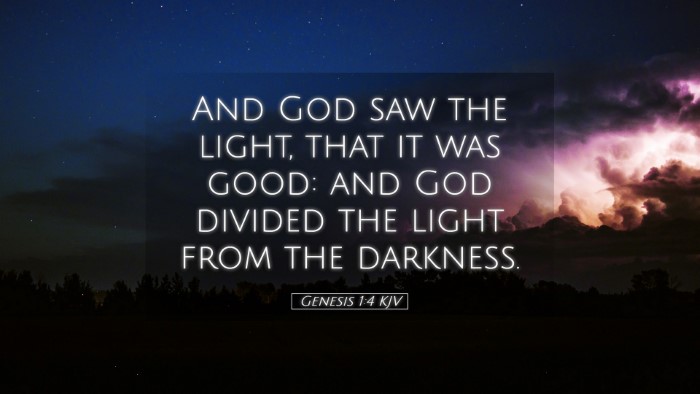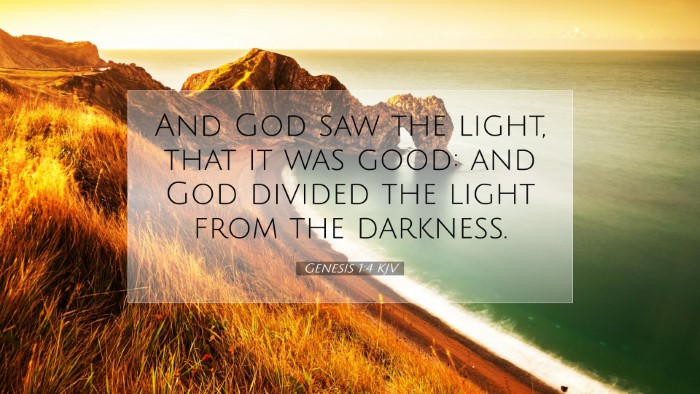Commentary on Genesis 1:4
Verse: "And God saw the light, that it was good: and God divided the light from the darkness."
Introduction
The creation account in Genesis is foundational to the Christian faith and provides crucial insights into the nature of God and His intentions for creation. Genesis 1:4 captures a pivotal moment in the creative process where God delineates between light and darkness, initiating a theme that reverberates throughout Scripture.
The Nature of Light
Matthew Henry highlights the significance of light as a divine creation. Light symbolizes purity, knowledge, and the presence of God Himself. The separation of light from darkness here signifies the establishing of order in creation, as light is often associated with truth and goodness.
Albert Barnes further expounds that the good nature of light is fundamental to understanding God’s creative will. By declaring the light "good," God not only affirms its role in creation but also marks the beginning of His moral order, establishing a contrast with darkness, which is often representative of chaos and evil.
The Act of Division
This verse illustrates God’s sovereign authority over creation. The phrase "and God divided" emphasizes that creation is not a random occurrence but a deliberate act of divine will. Adam Clarke notes this division indicates not only physical separation but also a spiritual and moral dichotomy, where light embodies God’s presence and revelation while darkness represents sin and separation from Him.
Theological Implications
- Understanding God’s Character: The act of seeing that "it was good" reflects God's inherent goodness and His evaluation of His own creation. This calls believers to conform to and reflect God's goodness in their lives.
- Symbolism of Light: Light is not just a physical phenomenon but holds theological significance. It serves as a metaphor for God's truth, revelation, and holiness. Throughout the Bible, light represents God's righteousness. In John 8:12, Jesus declares Himself as "the light of the world."
- Moral Division: The separation of light and darkness foreshadows the moral and spiritual struggles of humanity. It speaks to the ongoing conflict between good and evil. This division calls the faithful to choose light over darkness, following God’s path.
Practical Applications
For pastors, students, and theologians, Genesis 1:4 provides essential lessons in pastoral care, preaching, and personal spiritual growth:
- Preaching and Teachings: Emphasizing the goodness of God in creation can inspire congregations to appreciate the beauty and order in God's design.
- Spiritual Reflection: Believers are challenged to reflect upon their lives—are they walking in the light of Christ or dwelling in darkness?
- Christian Community: The church should exemplify the light of Christ in a dark world, serving as a beacon of hope and truth.
Conclusion
Genesis 1:4 is a profound statement about God’s sovereign will and the intrinsic goodness of creation. Light and darkness serve as powerful symbols that carry deep theological significance, inviting believers to understand their identities as children of light. As churches and individuals, they are called to embody and share this light within a world often shrouded in darkness. The rich insights from the commentaries of Matthew Henry, Albert Barnes, and Adam Clarke enable deeper appreciation of this brief yet powerful verse.


